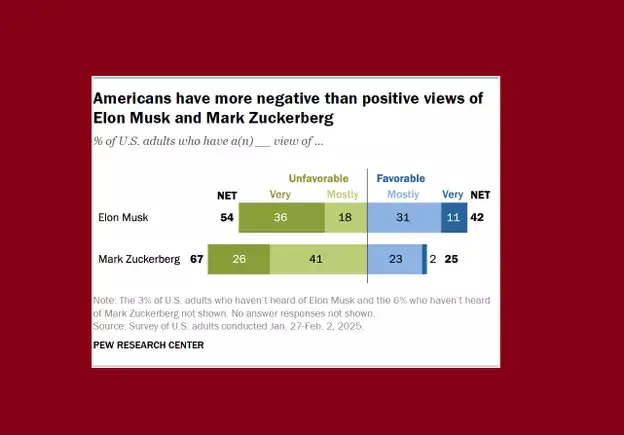Recent shifts in public opinion reveal a concerning trend for two of the most recognizable figures in the tech industry—Elon Musk and Mark Zuckerberg. According to a Pew Research survey conducted from January 27 to February 2, 2025, a majority of Americans hold unfavorable views of both leaders, indicating a troubling decline in their popularity. While the tech moguls were once hailed as visionaries reshaping the future, the recent data suggests that their actions have led many to view them with skepticism and disdain.
The survey highlights that over half of U.S. adults, precisely 54%, have an unfavorable opinion of Musk. This percentage includes a substantial 36% who harbor very unfavorable feelings toward him. In contrast, Zuckerberg is perceived even more negatively, with two-thirds of Americans expressing unfavorable views—26% of whom feel very negatively toward him. The contrast in public sentiment reflects a broader narrative about the increasing scrutiny faced by these billionaires, driven by their controversial actions and business decisions.
The apparent divergence in the level of animosity toward Musk and Zuckerberg raises questions about the underlying reasons for this disaffection. While Zuckerberg has sparked widespread criticism due to issues surrounding data privacy and the societal impacts of social media—specifically its role in shaping public discourse—Musk’s public persona has been marred by his unpredictable behavior, high-profile family disputes, and aggressive political statements.
People’s dissatisfaction with Musk often stems from his polarizing public remarks, particularly on social media platforms—the very platforms he has made contentious decisions about. His brazen dismissal of various societal norms and often inflammatory support for controversial political figures has pitched him into the political arena, which has undoubtedly alienated many potential supporters.
Conversely, Zuckerberg’s imprisoning association with privacy violations has solidified negative perceptions, particularly after the Facebook scandals regarding data leaks and misinformation campaigns. Many view him as a profiteer who has commodified personal user data with little regard for ethical considerations or the welfare of society. The concurrent personal and professional decisions of both billionaires fuel public disapprobation and solidify their branding as antagonistic figures in the business landscape.
Musk and Zuckerberg’s wealth and influence afford them substantial power within the realms of technology and beyond. However, with great power comes great responsibility. Their decisions often impact millions, from shaping consumer behavior to influencing societal norms. Yet their seeming disregard for public welfare raises the ethical question of how billionaires wield their influence.
Their resistance to regulation is particularly telling. In many respects, both billionaires position regulatory frameworks as encumbrances to innovation. While it is true that some regulations can stifle creativity and progress, the underlying intent behind these regulations is usually protection—of consumers, of data integrity, and of ethical business practices. Their insistence on pursuing their untrammeled agendas even at the expense of public trust serves to undermine their credibility and, in turn, diminishes their public relations standing.
As the public sentiment continues to pivot against Musk and Zuckerberg, the implications for their legacy become increasingly uncertain. History often remembers innovators as heroes, but these two are at a crossroads. The potential for them to either become celebrated icons or scorned figures largely hinges on their ability to recognize the broader ramifications of their personal and professional choices.
On one hand, they possess the vision and capability to drive groundbreaking advancements—in space exploration and social media engagement, respectively. On the other hand, their reputations could be irreparably damaged if perceived as self-serving billionaires indifferent to societal impacts. Therefore, it is essential to cultivate accountability and integrity in their actions moving forward.
While both Elon Musk and Mark Zuckerberg may still embody the essence of modern innovation, their paths forward are fraught with the complexities of public perception, responsibility, and ethical governance. Who they choose to be will not only shape their legacies but also define the future contours of the industries they represent.


Leave a Reply